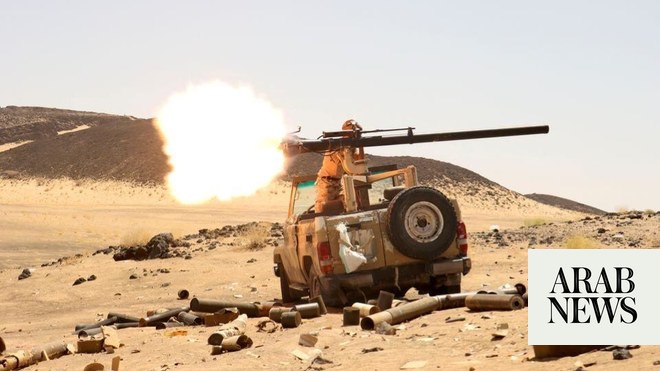
AL-MUKALLA: Yemen’s government troops on Tuesday pushed into the Houthi-controlled areas south of the central city of Marib for the first time in months, local officials and media reports said.
The government’s Giants Brigade, backed by the Coalition to Restore Legitimacy in Yemen, seized control of a large swathe of land in the district of Hareb in Marib province, less than a day after achieving full control of the oil-rich province of Shabwa, the Giants Brigades said in a brief statement.
The Iran-backed Houthis seized control of Hareb, Al-Abedia and parts of Juba districts in September last year shortly after making rapid progress in the neighboring provinces of Al-Bayda and Shabwa.
The terrorist militia’s gains paved the way for them to reach the closest point to the city of Marib, the main target of their deadly offensive in Marib province.
But the government forces have taken the offensive to the battlefields since the beginning of this month after the coalition redeployed several military brigades from the country’s west coast to the southern province of Shabwa.
If the government forces kept pushing deeper into Marib, they would have cut vital arteries for the Houthis south of Marib and finally alleviate the rebels’ military attacks.
On Monday, the governor of Shabwa, Awadh bin Al-Wazer, announced the full liberation of the province after expelling the Houthis from Ain district, the militia’s last pocket of land.
“We thank His Excellency the President of the Republic and the brothers in the Kingdom of Saudi Arabia and the UAE for all the generous support and efforts made to achieve this victory, and (we thank) the heroes of the Giants Brigades, the Army and the sons of Shabwa,” the governor said on Twitter.
The Giants Brigades had previously pushed the Houthis from Bayhan and Ouselan districts in Shabwa and later rolled into the Houthi territory in Al-Bayda.
Coalition warplanes have intensified strikes over the past 10 days, targeting Houthi-controlled cities, including Sanaa, and the militia’s reinforcements across the country.
The intensive airstrikes have paved the way for government troops to advance in Shabwa, Marib and Al-Bayda, Yemeni officials said.
On Tuesday, the coalition announced it had killed more than 350 Houthis and destroyed 39 of their military vehicles during the last wave of airstrikes in Marib and Shabwa province in the past 24 hours.
The official news agency SABA reported that Yemen’s President Abed Rabbo Mansour Hadi and senior officials called the governor of Shabwa and the commander of the Giants Brigades Abdul Rahman Al-Mahrami to congratulate them.
Citing battlefield successes by the Giants Brigades, Mohammed Al-Jaber, Saudi Arabia’s ambassador to Yemen, tweeted that the Yemenis would be able to end the Houthi coup and restore the state and peace to their country when they come together.
“The consensus and the unification of the ranks of the Yemeni forces would lead to the restoration of the state, peace and constructive dialogue on all issues,” the Saudi ambassador said.
Yemen’s experts and officials believe that successful operations alone would lead to an end to the war, as they would force the Houthis into accepting peace efforts and de-escalating.
“Any military action that forces the Houthis to retreat will eventually lead to de-escalation. The Houthis will not stop expanding until they are stopped,” Nadwa Al-Dawsari, a Yemeni conflict analyst, told Arab News.
The analyst called for the unification of Yemeni forces under one command to launch coordinated attacks on the Houthis.
“Without a consistent military offensive in which all frontlines are coordinated, we will continue in this vicious cycle. Shabwa cannot be safe if Marib is not safe and Marib is not safe if Al-Jawf and Al-Bayda are not liberated.”
In the western province of Hodeidah, the UN Mission to support the Hodeidah Agreement called upon the Houthis to give them access to the main ports in Hodeidah to make sure that they are used for military purposes.
“The United Nations Mission to support the Hodeidah Agreement notes with great concern the allegations of the militarization of the Hodeidah Ports. UNMHA has requested as part of its mandate to undertake an inspection and stands ready to address concerns pertaining to any militarization of the ports,” the UN mission said in a statement.
The UN request came days after the coalition accused the Houthis of turning the main ports in Hodeidah into entry points and military sites for bringing in and storing ballistic missiles from Iran.











